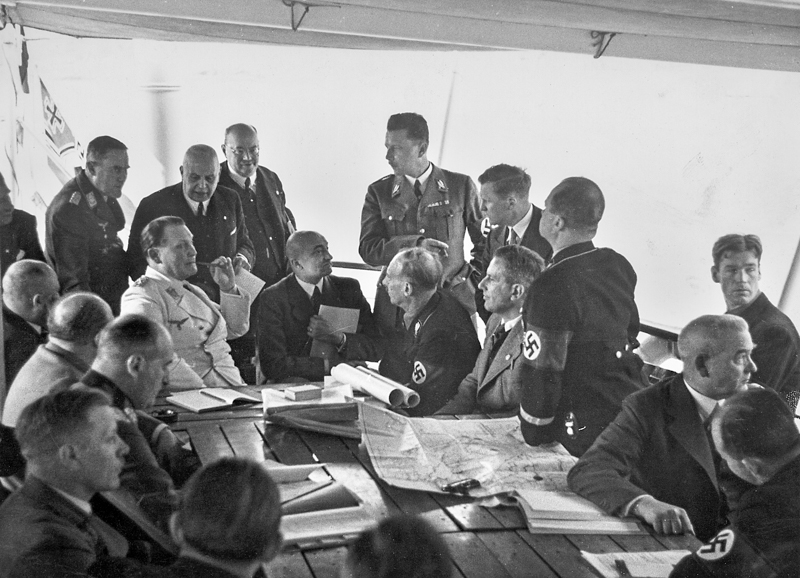Export of People and Goods
George Rublee, director of the Intergovernmental Committee in London, has long sought to arrange a meeting in Berlin to discuss facilitating the transfer of assets of Jewish emigrants. The Reich government is only prepared to negotiate on this point if it stands to gain economically from any deal.
Under strict secrecy, Reichsbank President Hjalmar Schacht and Rublee meet in London and Berlin around the turn of the year 1938/39 and craft an agreement that would link the transfer of a small portion of the assets of Jewish emigrants with the promotion of German exports. But the “Schacht-Rublee Plan” meets with sharp criticism on both sides, albeit for very different reasons, and is never concluded.
After both Schacht and Rublee step down from their posts, negotiations continue – until shortly before the outbreak of World War II – with Helmuth Wohlthat representing Germany and the Intergovernmental Committee represented by its deputy director, Robert T. Pell.
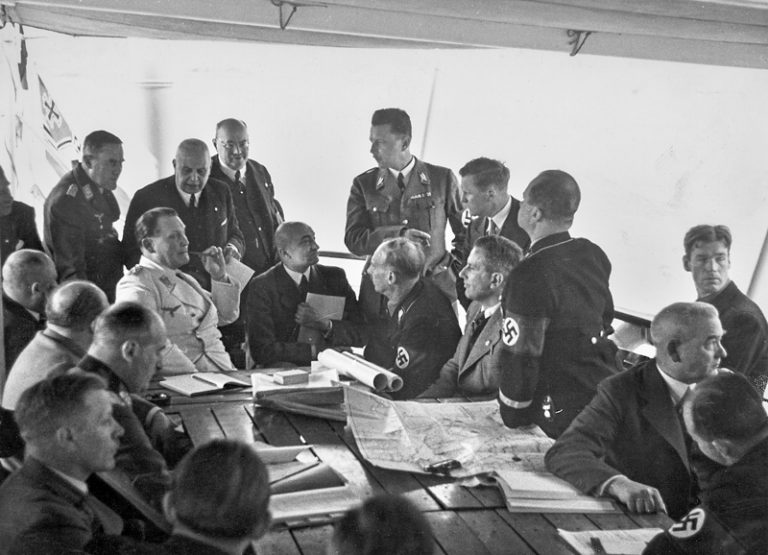
Hermann Göring (seated 4th from left in white uniform) and Hans Fischböck (7th from left) during consultations on board the Danube steamer Franz Schubert , March 25, 1938
The Reich government has long refused any contact with the Intergovernmental Committee in London. This remains the case until the autumn of 1938, when Austrian Nazi functionary Hans Fischböck convinces Hermann Göring, commissioner of the four-year economic plan, to negotiate a deal linking the emigration of Jews with the export of German goods.
Weltbild / Österreichische Nationalbibliothek, Wien, S300_3
Hermann Göring (seated 4th from left in white uniform) and Hans Fischböck (7th from left) during consultations on board the Danube steamer Franz Schubert , March 25, 1938
The Reich government has long refused any contact with the Intergovernmental Committee in London. This remains the case until the autumn of 1938, when Austrian Nazi functionary Hans Fischböck convinces Hermann Göring, commissioner of the four-year economic plan, to negotiate a deal linking the emigration of Jews with the export of German goods.
Weltbild / Österreichische Nationalbibliothek, Wien, S300_3
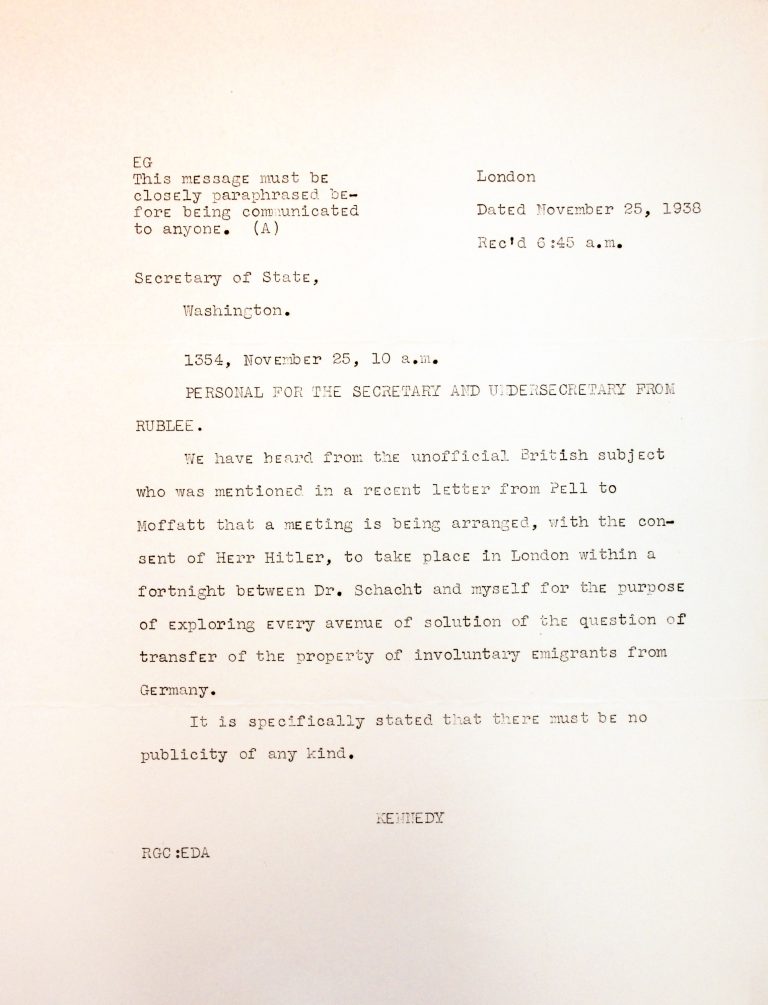
US Embassy in London to the US Department of State, with George Rublee’s report to Cordell Hull and Sumner Welles, November 25, 1938
Following a top-secret introduction via intermediaries, Reichsbank President and former Reich Minister of Economics Hjalmar Schacht holds unofficial negotiations with George Rublee in London in December 1938 and in Berlin in January 1939 on the emigration of the Jews.
National Archives, College Park, MD
US Embassy in London to the US Department of State, with George Rublee’s report to Cordell Hull and Sumner Welles, November 25, 1938
Following a top-secret introduction via intermediaries, Reichsbank President and former Reich Minister of Economics Hjalmar Schacht holds unofficial negotiations with George Rublee in London in December 1938 and in Berlin in January 1939 on the emigration of the Jews.
National Archives, College Park, MD
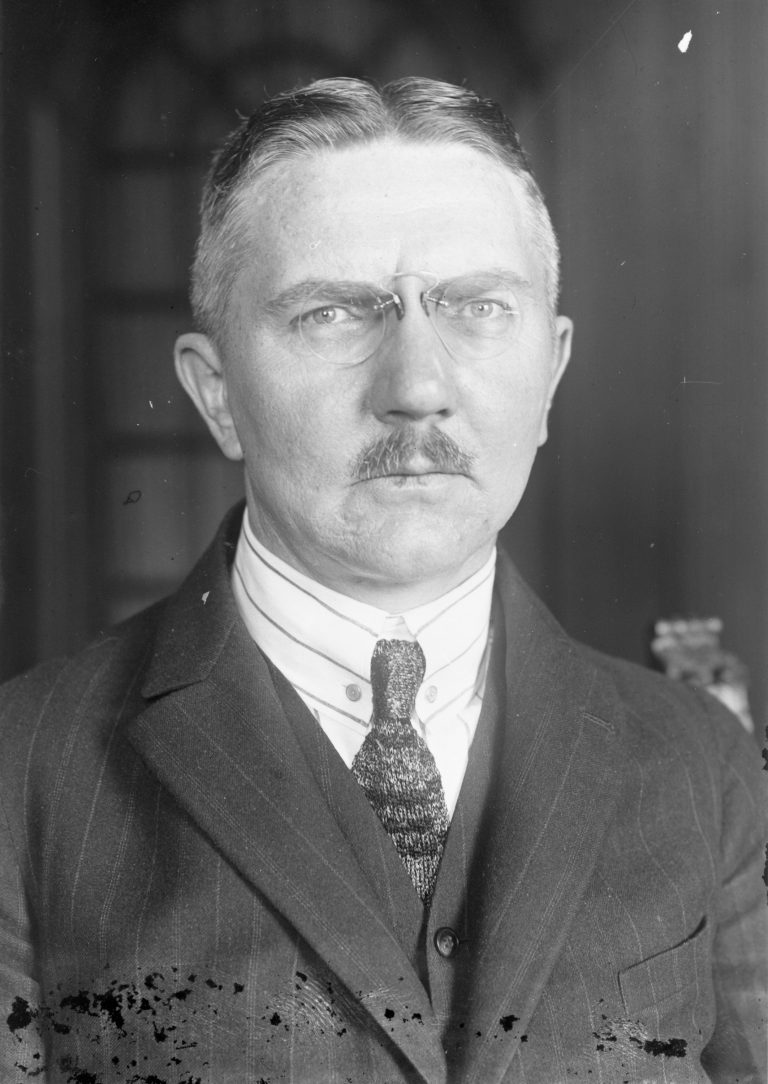
Hjalmar Schacht, 1931
The “Schacht-Rublee Plan” provides for emigrating Jews to invest a small portion of their assets in German goods, which they would then bring with them abroad. The goods would then be purchased by an international trust fund.
Bundesarchiv, Koblenz, Bild 102-12733
Hjalmar Schacht, 1931
The “Schacht-Rublee Plan” provides for emigrating Jews to invest a small portion of their assets in German goods, which they would then bring with them abroad. The goods would then be purchased by an international trust fund.
Bundesarchiv, Koblenz, Bild 102-12733
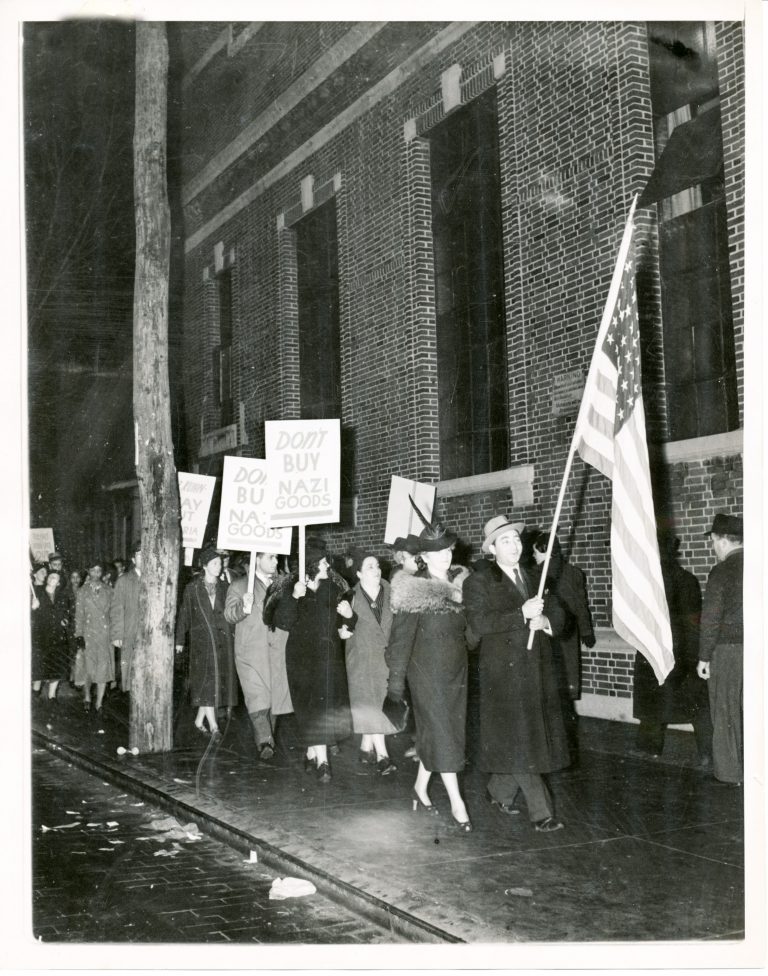
Demonstration against a meeting of the German-American Alliance in Long Island City, November 18, 1938
The movement to boycott German goods as a protest primarily against the persecution of Jews in Germany finds increasing international support.
ACME Press Photo / Zentrum für Antisemitismusforschung / Technische Universität Berlin
Demonstration against a meeting of the German-American Alliance in Long Island City, November 18, 1938
The movement to boycott German goods as a protest primarily against the persecution of Jews in Germany finds increasing international support.
ACME Press Photo / Zentrum für Antisemitismusforschung / Technische Universität Berlin
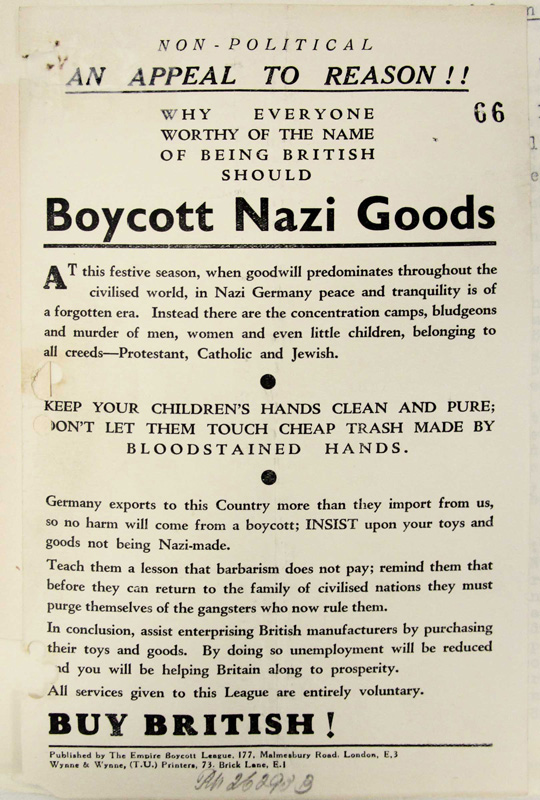
British call for boycott of Nazi goods, London 1938
Thus the “Schacht-Rublee Plan” is overwhelmingly rejected, because it accepts the extensive Nazi expropriation of the Jews as a given and promotes the export of German goods.
Bundesarchiv, Berlin, R43II-1436a, Bl. 66
British call for boycott of Nazi goods, London 1938
Thus the “Schacht-Rublee Plan” is overwhelmingly rejected, because it accepts the extensive Nazi expropriation of the Jews as a given and promotes the export of German goods.
Bundesarchiv, Berlin, R43II-1436a, Bl. 66
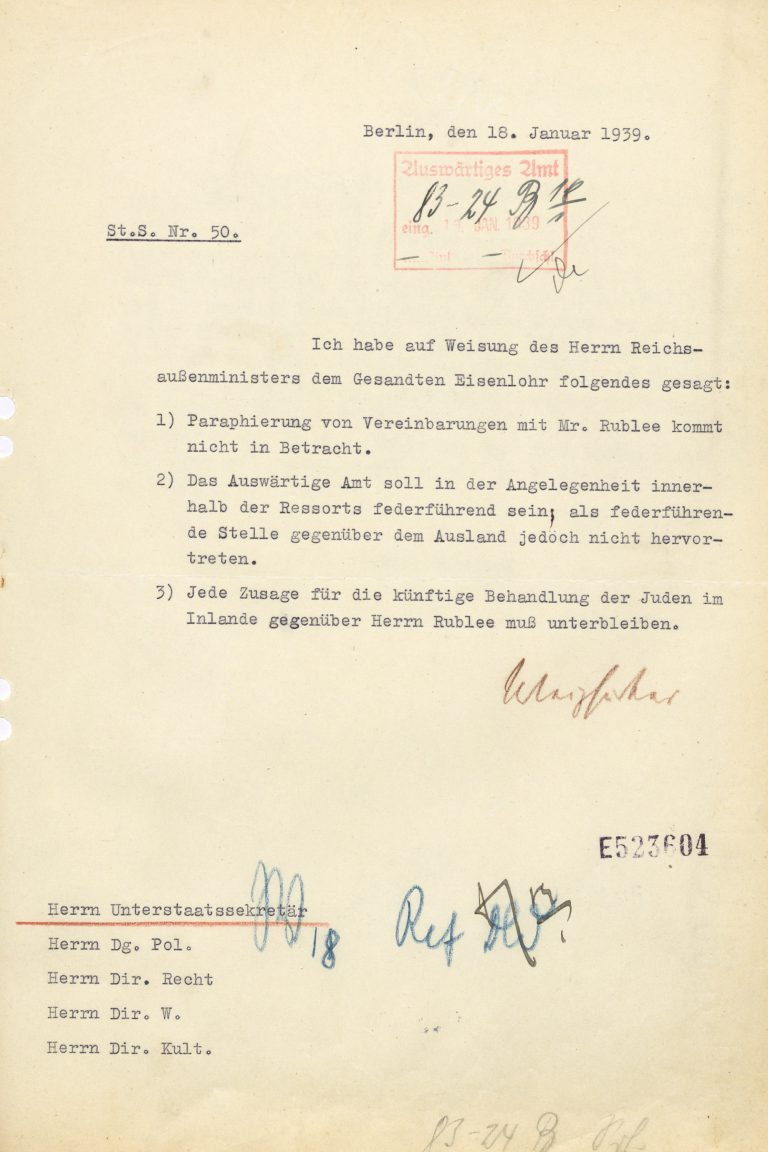
Note from Ernst v. Weizsäcker, State Secretary in the Foreign Office, about the instructions to the German Ambassador in London, January 18, 1939
The “Schacht-Rublee Plan” is never launched, in part because of its extremely negative reception by international Jewish organizations but also because the German Foreign Minister categorically refuses to sign off on it, utterly rejecting “any commitments on dealing with the Jews” in Germany.
Auswärtiges Amt / Politisches Archiv, Berlin, R 99366
Note from Ernst v. Weizsäcker, State Secretary in the Foreign Office, about the instructions to the German Ambassador in London, January 18, 1939
The “Schacht-Rublee Plan” is never launched, in part because of its extremely negative reception by international Jewish organizations but also because the German Foreign Minister categorically refuses to sign off on it, utterly rejecting “any commitments on dealing with the Jews” in Germany.
Auswärtiges Amt / Politisches Archiv, Berlin, R 99366
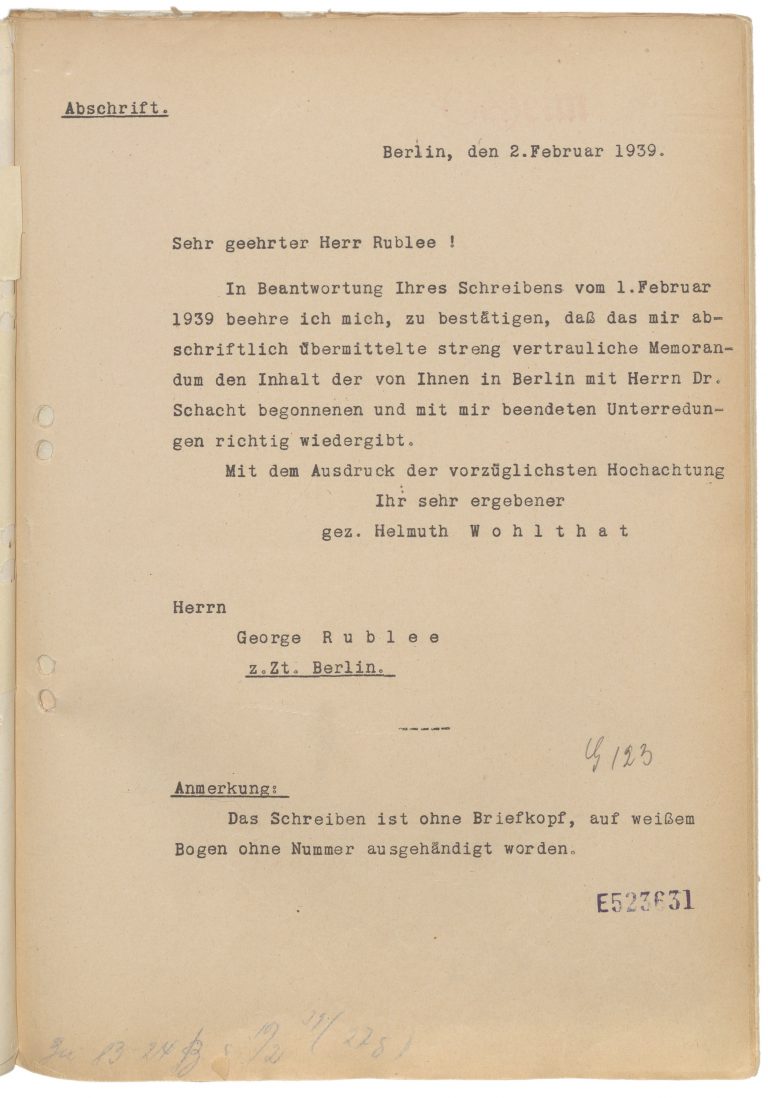
Helmuth Wohlthat to George Rublee, February 2, 1939
On January 19, 1939, Hjalmar Schacht is dismissed as president of the Reichsbank. Helmuth Wohlthat, undersecretary for the four-year economic plan in Göring’s agency, is appointed as Schacht’s replacement in negotiations with Rublee.
Auswärtiges Amt / Politisches Archiv, Berlin, R 99366
Helmuth Wohlthat to George Rublee, February 2, 1939
On January 19, 1939, Hjalmar Schacht is dismissed as president of the Reichsbank. Helmuth Wohlthat, undersecretary for the four-year economic plan in Göring’s agency, is appointed as Schacht’s replacement in negotiations with Rublee.
Auswärtiges Amt / Politisches Archiv, Berlin, R 99366
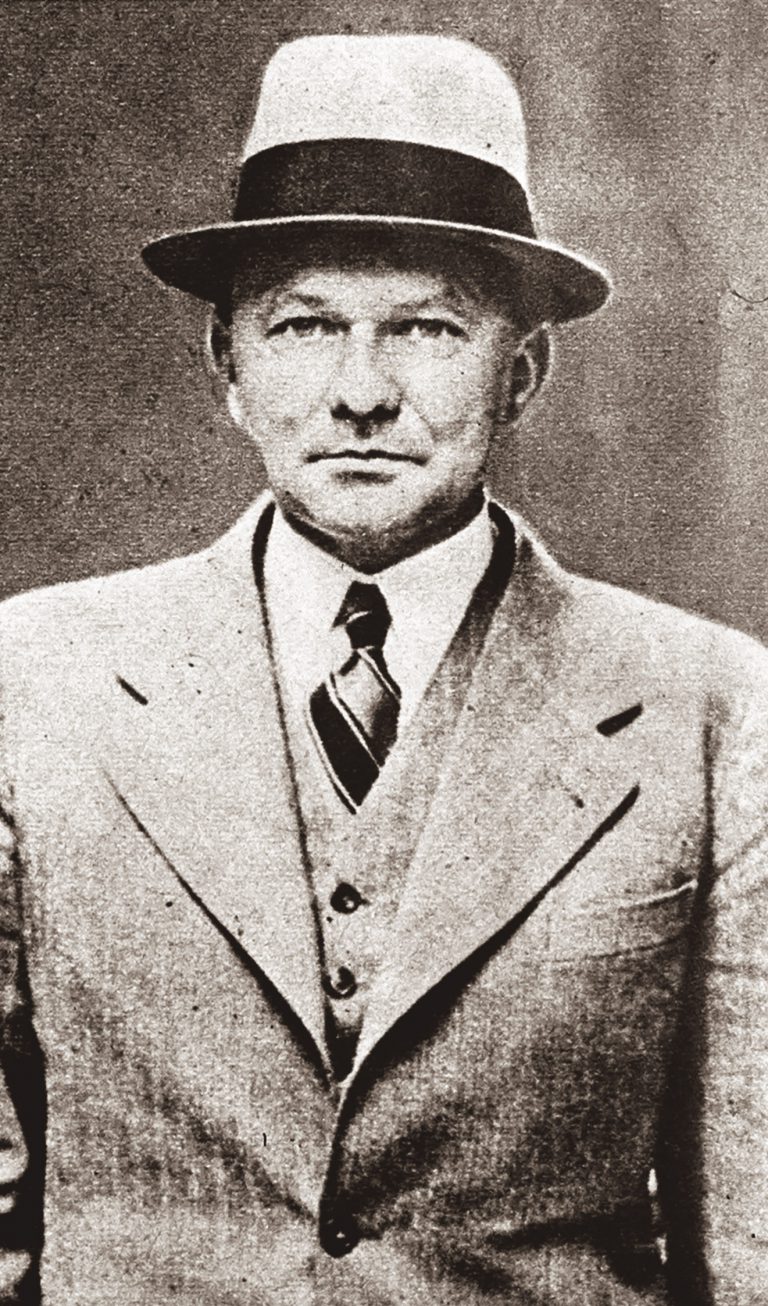
Helmuth Wohlthat, 1940
Nationaal Archief, Den Haag
Helmuth Wohlthat, 1940
Nationaal Archief, Den Haag
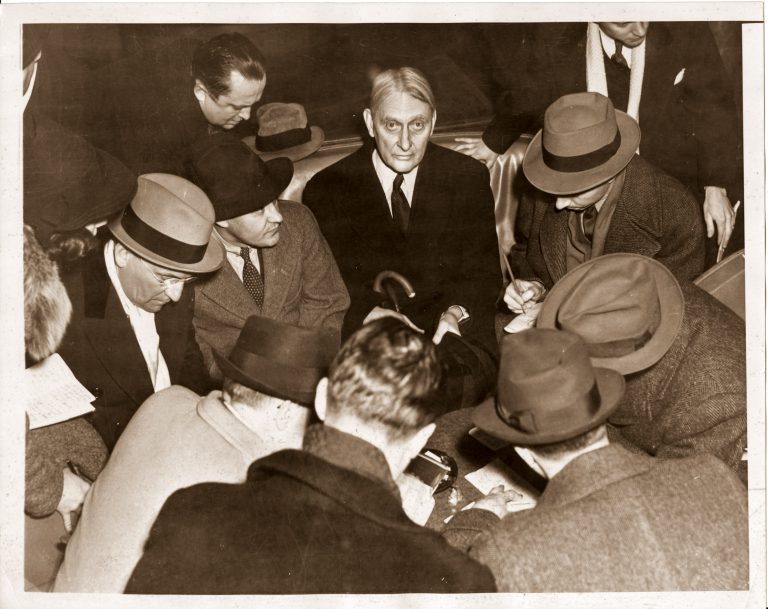
George Rublee surrounded by reporters upon his arrival in the US aboard the Queen Mary, February 28, 1939
In late February 1939 George Rublee concludes his mission and returns to the US, where he is forced to confront critical questions regarding his negotiations with the Nazi regime. His successor as director of the Intergovernmental Committee is Sir Herbert Emerson, League of Nations High Commissioner for Refugees from Germany. This brings the two institutions even closer together. Negotiations with the German government are to be conducted by Robert T. Pell, deputy director of the Intergovernmental Committee.
Bettmann Archive / Getty Images
George Rublee surrounded by reporters upon his arrival in the US aboard the Queen Mary, February 28, 1939
In late February 1939 George Rublee concludes his mission and returns to the US, where he is forced to confront critical questions regarding his negotiations with the Nazi regime. His successor as director of the Intergovernmental Committee is Sir Herbert Emerson, League of Nations High Commissioner for Refugees from Germany. This brings the two institutions even closer together. Negotiations with the German government are to be conducted by Robert T. Pell, deputy director of the Intergovernmental Committee.
Bettmann Archive / Getty Images
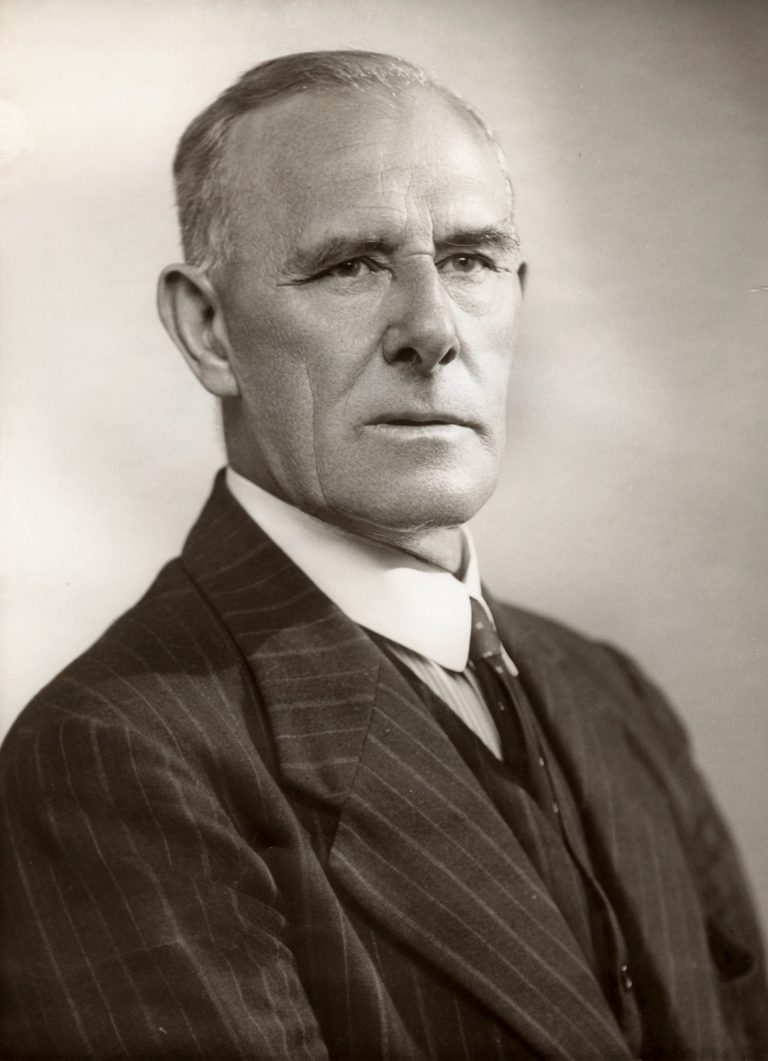
Sir Herbert William Emerson, 1941
Photo: Bassano Ltd. / National Portrait Gallery, London
Sir Herbert William Emerson, 1941
Photo: Bassano Ltd. / National Portrait Gallery, London
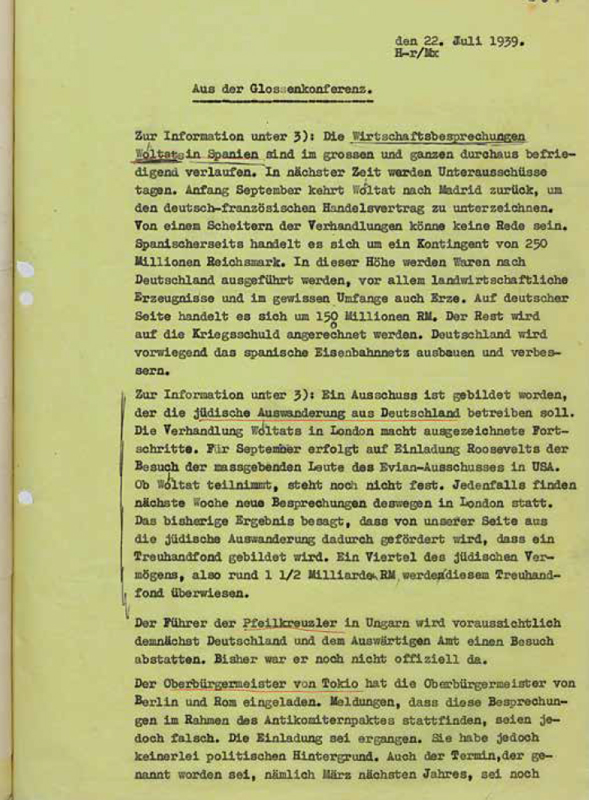
Reich Ministry of Public Enlightenment and Propaganda: “Aus der Glossenkonferenz,” July 22, 1939
Wohlthat and Pell continue their negotiations about modifications of the “Schacht-Rublee-Plan” until the summer of 1939 in London. Wohlthat also explores the possibilities of a German-British understanding. This is likely one reason why National Socialist propaganda tries to portray its negotiations with the Intergovernmental Committee as extremely promising, until the beginning of World War II finally puts an end to these talks.
Bundesarchiv, Koblenz, Zsg. 102/18, Bl. 307
Reich Ministry of Public Enlightenment and Propaganda: “Aus der Glossenkonferenz,” July 22, 1939
Wohlthat and Pell continue their negotiations about modifications of the “Schacht-Rublee-Plan” until the summer of 1939 in London. Wohlthat also explores the possibilities of a German-British understanding. This is likely one reason why National Socialist propaganda tries to portray its negotiations with the Intergovernmental Committee as extremely promising, until the beginning of World War II finally puts an end to these talks.
Bundesarchiv, Koblenz, Zsg. 102/18, Bl. 307
